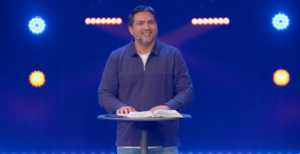We’re doing this series on Flourishing. And if you missed the past two week, it’s based on a Harvard Study we read that has recently come out trying to help people on the backside of all the Covid, political and social unrest, and now economic unrest—to understand what it is that leads to feeling like you’re flourishing in life. And what we found fascinating, is that it basically leads back to God’s wisdom told in the Bible for 1000s of years.
In fact, Harvard Professor VanderWeele, who founded the Human Flourishing Project talks about 4 pathways to Flourishing:
“The four pathways…—family, work, education, and religious community–are important, and common, and that if efforts were made to support, improve, and promote participation in these pathways, the consequences for human flourishing would be substantial.”
VanderWeele, Harvard Flourishing Project Founder
Considering that about ½ of people once involved in church have gotten in new habits of just staying home and watching online, Harvard actually found involvement in religious community a very important, predictive pathway to human flourishing:
“Evidence suggests that it is attending religious services, rather than private practices or self-assessed spirituality…It is the communal form of religious practice that appears to bring about better health outcomes…happiness and life satisfaction.”
-VanderWeele.
So “Come on back to church” says Harvard University. Don’t stay disconnected. And it’s not just attending services, but growing and serving and learning together in community that helps you flourish.
So today we’re talking about Flourishing Financially—and what great timing—as Inflation soars and the stock market plummets and global recession scares and talk of bubbles bursting are everywhere. You know, I noticed something I saw a Youtube clip by Ray Dalio on the economic apocalypse about to happen. And I watched it, and then Youtube saw I was interested, so they fed me another: I watched “The global economy will crumble” then “This crisis will be far worse than 2008 by 20x” and on and on. By the end of about 7 videos, I was terrified. Then I saw a clip by Warren Buffet how he invests when everyone else is terrified, and that led to another value investing video about “Buy when there’s blood in the streets” and on and on. The point is this—no one knows the future—except God. And while you can gain wisdom from pundits on Youtube, you can also be led astray from tried and true principles that lead to Flourishing Financially. That’s what I want to talk about today. I want to talk about
3 Financial Mindset Traps and Freedom Declarations to get you out
Here’s why—because Flourishing Financially is a Mindset first and foremost. And Harvard found this too—you can have little money relatively speaking and flourish, and even feel content, happy, like you have enough financially to save, be generous not have to worry about money. And you can have millions and not flourish financially—you can still not feel content, happy, like you have enough to not worry, to be generous. So we have to start with the Mindset. And it’s Mindset that often leads us into good or bad financial habits that can help us prepare for inevitable downturns or crises. So Flourishing Financially starts with a Mindset—there are things you must Stop Saying to yourself and other things to Start Saying—and this is God’s wisdom as I will show you, not just Harvards. Harvard is just revealing God’s wisdom of the ages.
So Here’s the first thing to Stop Saying if you want to Flourish:
STOP SAYING: I NEED that now!
Of course, we don’t actually say that, but it is an internal mindset we can develop—and maybe some of us just grew up training our minds to think this way—if we see something we’d like, or something we want, we turn it into a “need.” “I need that car.” “I need those shoes.” “I need a bigger house.” Whatever it is. But a need is a necessity—it’s necessary for life. And what happens when we turn wants into needs is we find ways to get it, even if we can’t afford it. And of course, that’s where Americans live, on debt. I’m not gonna shame you about having debt, We’ve all been bombarded by marketing messages, consumer debt as a lifestyle, but the fact that so many of us have more debt than savings is indicative of a Mindset that we can be aware of and change—otherwise it’s going to lead to the same trap.
I just helped a friend find a way to get out of his debt trap. He had accumulated $10,000 of debt yet didn’t have 500 in savings in case of an emergency, and all the nice people at Capital One and Best buy and Mastercard had been so kind to say “You need that new TV, and we can help.” But now he was paying 22 to 28% interest on 6 credit cards. And he was paying the minimum monthly payment because the debt payments got too big to do anything but the minimum. But do you know how long it would take to pay off $10,000 making only minimum payments? Say you got a great card, only 18% interest instead of 28%–It would take 28years to pay off the debt by making minimum payments alone. During that time, you’d pay $14,423 in interest. You’d pay 144% more than the original $10,000.
Now, no one gets in debt as a choice. You don’t say “I NEED to be in debt—I need to owe more money, so I can barely make my monthly payments—I NEED to feel more worry and anxiety.” You don’t say that, You say “I need that starbucks.” “I need a vacation.” Right? It starts with a mindset. Well, God gives wisdom on changing our mindset:
Godliness with contentment is itself great wealth. 7 After all, we brought nothing with us when we came into the world, and we can’t take anything with us when we leave it. 8 So if we have enough food and clothing, let us be content. 1 Timothy 6:6-8.
Some of you are already saying Mindset Traps “I’m ever going to be content with just food and clothes—never. God wants me living in poverty.” NO—that’s another false mindset that keeps us stuck. That’s not what this is saying. This is saying what’s true: You come into this world with nothing, you’ll leave with nothing—what you really NEED is food, yes, clothes, shelter, and here in America a Car and a 65” Flatscreen 8000k TV—it’s necessary for hi-def football or soccer viewing—not even a question. The point is some things are true needs, the rest are wants.
So here’s how you change your mindset—according to God and Harvard. If you’re in debt, and you see something you “NEED” don’t say “I need that, change to a Freedom Mindset:
I don’t need that, I want that, and I can wait.
And then commit to getting out of debt before you make that purchase. Scripture says,
Give to everyone what you owe them…Let no debt remain outstanding, except the continuing debt to love one another…. Romans 13:7-8.
If you have debt, Sign up for Financial Peace University—Mark and Aman and expert volunteers will help you make a Freedom plan. No one will know your business, you’ll just be able to get on a debt payment plan. The average person who does pays off $5300 and saves $2700 in 90 days. Do it.
Maybe you have zero debt, but don’t check out. I’ve known multimillionaires who told me, “I worry and feel anxious about money constantly, I’m never satisfied or content.” Well that’s not good—that’s a financial trap Mindset if there’s never enough to feel content. So the answer is change your mindset. Here’s how…
Gratitude. Gratitude leads to contentment, which as scripture says, the ability to be content is itself a form of wealth. The Harvard Flourishing Project recommends this gratitude exercise: “Write down three things that you’re grateful for each day; write about their causes (for us thank God), and to do this every night, for one week.”
The Flourishing Project study found “Those who were assigned to do this…had higher levels of happiness and lower levels of depressive symptoms, even six months later than did a control group.” Financial Flourishing is a Mindset: Stop saying “I Need that” and start saying “I don’t need that, I want it, and I can wait.”
Next Trap:
STOP SAYING: I’m not rich like____!
Let’s be honest, what often drives our financial choices is comparing ourselves to others. But it’s worthless. That’s what Solomon, the wealthiest man ever came to realize:
Then I observed that most people are motivated to success because they envy their neighbors. But this, too, is meaningless—like chasing the wind. Ecclesiastes 4:4
When we compare up, we envy. We may say it in different ways, but we envy what another has, or where they go, or what they post on social media. And that envy of what others have is a trap that will keep you from Flourishing Financially—no matter how much you have, it will never be enough. Envy is against God’s ways—that’s why he commands us not to compare and envy. It is a trap, let me prove it to you. Why do you always compare up? Why don’t you compare down? Ever think about that?
I’ve traveled to over 30 countries—some of the poorest countries in the world—Our envy is skewed. If you make above the American Poverty line for a family, $25,000/yr, you make more than 93% of 7 billion people–Cost of living adjusted—you are richer than the whole world. Which means if you don’t feel it, you need a mindset shift to free yourself so you can flourish.
I’ve been into the home of Samuel, a child Kathy and I support in Guatemala through Compassion International—he and his brother live with their mother in a corrugated metal shed. Yet what hit me about Elizabeth, his mother, is how loving, kind, generous and happy she is—she loves the Lord and showed me how someone can flourish even in poverty. I’ve seen the same flourishing with people living in mud huts in India, or in Haiti, in favelas in Brazil or Townships in S. Africa. Friends, flourishing is not a function of financial amount. If you don’t believe me, you need to go serve with our Go Teams in Haiti or India or Nicaragua. And stop comparing up to envy those who have something you don’t, and start thanking God for all you’ve been given compared to most of the globe.
And learn to Savor – to enjoy what you do have with gratitude. What the Harvard Flourishing Project recommends is a mindset change from wanting to savoring—savoring meaning being able to enjoy what you have.
Paul says: “I have learned the secret of being content in any and every situation….” – Philippians 4:12
The secret is let God’s Spirit teach you contentment by enjoying what you have with thankfulness. God gives us all we have for our enjoyment.
1 Timothy 6:17 says: “Command those who are rich in this present world not to be arrogant nor to put their hope in wealth, which is so uncertain, but to put their hope in God, who richly provides us with everything for our enjoyment.”
Replace comparing up with thanking God and learning to enjoy what you have—savoring it with thanksgiving. You just have to quit the world’s comparison game, and live faithfully for God.
I know what it feels like to envy. When I left my Engineering career for ministry. I’d go home to Houston, and I’d go visit my college buddies who were getting promotions and buying boats and ranches and taking exotic dive trips – and honestly, it was hard to not compare. I felt worth-less. Comparison does that—it makes you feel worth-less. And I finally came to a spiritual crisis point. Where I asked God for help, and he helped me see I needed to quit. To quit trying to win the comparison game – because you can’t. So I declared “I quit that game.” “I’m not running the rat race.” “I’m in a different race.” There’s always someone who has more. I’m not gonna jack myself around and cheat God or my family by trying to keep up with some peer group that doesn’t really care anyway. And when I quit comparing, I found incredible freedom. Freedom to know that only God can give the final stamp of approval – the real valuation of my worth. That was a spiritual moment. I found freedom to run my own race – being faithful with what I’ve been given before God. Have you found that Freedom to Flourish? Stop saying “I’m not rich like…” stop comparing, start saying
Freedom Mindset: “I quit that game. No more comparing. I’ll enjoy what I have.”
Last mindset trap:
STOP SAYING: “I Can’t Save or Give Until…”
Do you know that “Most people in the United States are living on the edge financially….According to a recent study by GOBankingRates, 57% of Americans (57%) have less than $1,000 in savings. According to Bankrate, most don’t have enough money saved to cover a $500 unexpected expense. Not having enough money in the bank is more than a mathematical problem. A lack of savings can also cause significant stress, worry, marital struggles. But more importantly, it’s unnessasary. It comes from a wrong mindset that says “I Can’t…”. “I Can’t save or I can’t give until I reach this certain level.”
When you realize how much we have compared to the rest of the world, you see it’s really a choice. Do you realize that in your lifetime, millions of dollars will flow through your hands. You’ll make decisions about where millions of dollars will go. That’s a lot of choice. If you are just average here in Austin, make the median household income, $4.3 million dollars will flow through your hands in your working life. So how can nearly 60% of us not save $500 for an emergency? “I Can’t”—it’s a mindset. A choice. So make a different choice.
The problem is it doesn’t feel like a choice. Because we say yes to a bunch of things like a certain size apartment or house with rent or a mortgage, auto loan, school debt we may still have, and then we want to live, we want to enjoy life and have stuff, nothing wrong with that…but choice by choice it does feel impossible “I can’t.” So you have to change your mindset to say “I Can save and give and live on the rest—it just have to make different choices.” The sooner you make those choices the easier and freer you’ll start to feel.
I’m gonna share with you what I learned when working as an Engineer in Santa Barbara. I met Bill at church—Bill had just come to faith, we were meeting talking about faith, and he advised me on financial matters. He had started an insurance company and was doing really well and just had a good financial mind. One day over at his house, which is on the beach just down the road from Oprah, right next door to Charlie Munger, Warren Buffet’s partner (how is that for name dropping)?? Here’s what Bill told me as a 25-year-old Engineer. John, it really doesn’t matter how much money you make, you can end up with more than you’d imagine if you just pay yourself first. I asked, “What do you mean pay yourself first?” He said, “You pay the landlord, the bank, the credit card company, the electric company—you pay all these people—but pay yourself first, before you pay all them. I made it a habit to take 10% of what I made, pay myself, and then learn to live on the rest—and it grew and allowed me to start my company.” I challenged him to alter that to honor God first—invest in God’s kingdom first. And Bill did—and do you know that you’re listening to this today because Bill grew in generousity along with many others—who helped fund the start of Gateway church about 10 years after that conversation.
But I got on the 10-10-80 plan. Take every paycheck, give 10% to God’s purposes in the world, pay youself 10% into long-term savings to invest, then budget and live off the 80%. That may seem impossible, but you’re probably leaving God out of the math. In Malachi 3 God gives a promise. It’s actually the only place in scripture that God says, Test Me.
“Bring the whole tithe into the storehouse, that there may be food in my house. Test me in this,” says the LORD Almighty, “and see if I will not throw open the floodgates of heaven and pour out so much blessing that you will not have room enough for it.” Malachi 3:10 T
he wisdom of scripture says first honor God by setting aside 10% to give toward the work of God in the world. And I believe God wants us to do this as a Mindset check–to remind us regularly that we are God’s trustees. That all of it will one day pass on to another and the only thing left will be our souls and God. Jesus said a lot about this as a test of faithfulness and heart. He told the Pharisees,
You should tithe, yes, but do not neglect the more important things. Matthew 23:23
Like love, justice, mercy Jesus said—it’s a heart thing. And how we think about money shapes our souls. So Money is a tool in the hands of your soul – that’s all.
Maybe the 10-10-80 seems impossible: “I Can’t until…”. But here’s where the God part comes in—if God is telling the truth, then your 100% will end up less than 90% with God involved. In other words, 90% with God involved turns out to be more for you—more Financial Flourishing—and I’m not just talking about more money, but more contentment, more peace, more life enjoyment, less worry—these are spiritual things that money can never give you, but God can and will. And think of the power you have to do good in the world.
If you’re average here in Austin, you would invest 430,000 into God’s work tithing over your lifetime. Think about all the good we’ve done together as a church because we’ve given back to God and used our resources together. We build a Million-dollar hospital in Rajamundhry India for an impoverished village—now people living on $2/day have a hospital. We’ve provided fresh drinking water to villages in the DR, in Nicaragua, Haiti—we have helped a Haitian village solve systemic poverty issues. We started and support a Refugee church in Austin, helped start and fund a free Medical Clinic for Refugees, we sponsored 1000 children for a year when the Mideast crisis was happening, I could go on and on—you don’t have time to hear all the good we’ve done around the globe. But that wouldn’t happen if we didn’t choose to honor God first.
But God doesn’t want you to give to your own harm—that’s a lie as well. He wants you to save—to pay yourself too. God gave wisdom to Joseph instructing the Pharoah to save for a crisis coming:
“Let Pharaoh proceed to appoint overseers over the land and take one-fifth of the produce of the land of Egypt during the seven plentiful years….That food shall be a reserve for the land against the seven years of famine….” Genesis 41:34-36.
God’s wisdom tells us to save because we live in a fallen world where famine and war and crises do happen—God wants you wise and prepared.
“Go to the ant, O sluggard; consider her ways, and be wise. Without having any chief, officer, or ruler, she prepares her bread in summer and gathers her food in harvest.” Proverbs 6:6-8.
The ant can store for winter, so we can too.
So first honor God—give, then save—pay yourself.
And Financial Peace and most advisors will say save 3 months salary in a “Do not touch” emergency account. That way, if things go south, you don’t have to panic. Lose a job, you have some time. Your car dies and you need it for work—take from the emergency fund, but then replenish it immediately. Here’s the thing—the longer you wait to get on the 10-10-80 plan, or some version of it—the harder it will be to start. Because it’s first a Mindset. You CAN live on the 80%, but you may have to make some hard choices to get there. But once you get there, it’s freeing—you’ll be doing a lot of good in the world, you’ll have margin in savings, and if you keep saving 10% and invest it—like Mark and Aman can help you with if you go to FPU—look how it can grow.
Let’s say you have $4000 of credit card debt. Say you go to FPU offered on our web page, get on a plan to pay off the debt (by paying $5 a day you’re debt free in 2 years), then after paying off $4000 of debt, you keep saving $5/day and in two years you’ll have squirreled away $4000 in savings. But now, instead of paying compounding interest, you make it—you keep saving $5 a day, investing in the S&P 500 ETF in an IRA (which has compounded at 10% the past 40 years) and you don’t touch it for the next 35 years. You would have $582,000. Save $10/day invested at 10%, and you’ll have 1.1 million in savings. As Dave Ramsey of FPU says If you’ll live like no one else now (saying no to debt spending, giving and saving monthly), you can live like no one else later. But it requires a mindset shift.
Flourishing Financially is a Mindset—Stop saying “I Can’t save or give until.”
Start Saying Freedom Mindset: “I will honor God and pay myself first, and I’ll choose to live on the rest.”
And when we do, our mindset leads us into something that is independent of amount. We actually flourish—we enjoy all we have. We are being wise trustees, doing good, saving for the future, we can feel good about enjoying what we have with gratitude to God.




